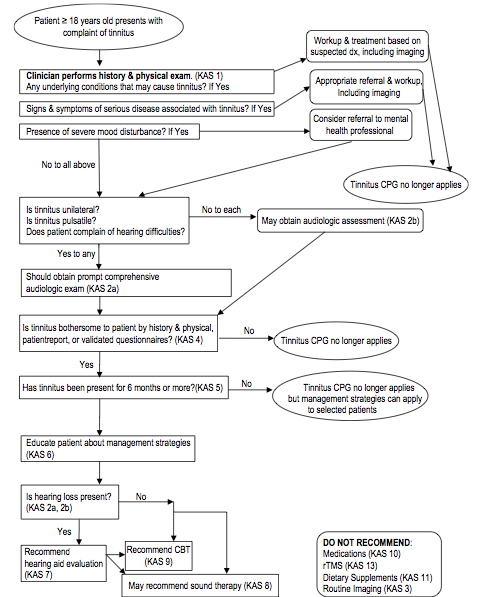American Academy of Otolaryngology Encourages Audiological Evaluation and Management of Tinnitus Patients
The University of Iowa
Great news for tinnitus patients – and you are part of the great news!
Clinical Practice Guideline: Tinnitus has recently been published by the American Academy of Otolaryngology.1 It documents our responsibilities and opportunities to help patients with tinnitus. These guidelines are based on a comprehensive review of literature on tinnitus diagnosis and management. Various assessment, management and educational issues were considered during the development of these guidelines. Recommendations for and against medications, devices and procedures are provided. No recommendations have been provided where evidence is limited. The recommendations primarily concern patients with chronic (tinnitus persisting for more than six months) bothersome tinnitus.
First and foremost, a complete and thorough medical and demographic history of the patients with tinnitus is recommended. This should include probing for history of noise exposure, history of exposure to ototoxic medications, presence of hearing loss, nature of hearing loss, onset of hearing loss, laterality of hearing loss, onset of tinnitus, laterality of tinnitus, balance issues, and associated psychological and/or psychiatric symptoms. A complete audiological evaluation is recommended next. This may include otoscopy, cerumen removal (if needed), ear-specific speech recognition threshold and word recognition testing and immittance testing, in addition to routine audiologic evaluation.
Use of questionnaires to differentiate between bothersome and non-bothersome tinnitus is highly recommended. Since the writing of the Guideline, a new questionnaire has been published, which can guide treatment (and measure effectiveness).2
Hearing aids and/or sound therapy devices are recommended. In our experience, these devices can often be extremely helpful in assisting patients cope with their tinnitus. Also as recommended, we provide self-help books along with devices.3,4
The guidelines also provide a visual algorithm of recommendations based on patient symptoms (Figure 1). Educational and counseling approaches are recommended for patients who need them. Providing information to patients regarding available resources and support groups seems to be helpful. The inclusion of Cognitive Behavior Therapy (CBT) is also recommended in the guidelines. We have found the books by Jane Henry and Peter Wilson to be extremely helpful.5,6 Although an 8–10 weeks program is outlined in the Guidelines, there are several tinnitus counseling protocols that include CBT and do not require as much time. For example, Tinnitus Activities Treatment includes CBT components in its focus on the four primary functions affected by tinnitus - thoughts and emotions, hearing, sleep, and concentration.7 This individualized treatment requires only 2–5 weeks, depending on individual problems.

Figure 1. Algorithm of guideline key action statements. Reprinted from Tunkel.1
Presently, there are no medical treatments or dietary supplements recommended for tinnitus. There are recommendations against supplements such as ginko biloba, melatonin, etc. Clinicians are advised to recommend against use of neuroimaging techniques and transcranial magnetic stimulation for clinical patients until further evidence is obtained.
These guidelines will help audiologists recommend procedures based on extensive evidence. The publication of these guidelines means that there will be an increase in referrals of tinnitus patients from the healthcare community. The counseling, hearing aid and sound therapy strategies for helping these patients have been around for a long time.8 However, these guidelines will help create greater awareness in both healthcare and patient communities.
Prepare yourselves to provide comprehensive tinnitus treatments and help these patients in need!9
References
- Tunkel DE, Bauer CA, Sun GH, Rosenfeld RM, Chandrasekhar SS, Cunningham ER, et al. Clin PractGuidel: Tinnitus. Otolaryngol Head Neck Surg 2014;151(2S) S1–S40.
- Tyler R, Ji H, Perreau H, et al. Development and validation of the Tinnitus Primary Function Questionnaire. Am J Audiol 2014;23:260–272.
- Tyler RS (Ed). the consumer handbook on tinnitus. Auricle Inc: Sedona; 2008.
- Davis PB. Living with tinnitus. Sydney, Australia: Gore & Osment Publications, Health Book Series; 1995.
- Henry J. and Wilson P. The psychological management of chronic tinnitus: A cognitive-behavioral approach, Allyn and Bacon; 2000.
- Henry J. and Wilson P. Tinnitus: A self-management guide for the ringing in your ears. Allyn & Bacon; 2001.
- Tyler RS, Gehringer AK, Noble W, et al. Tinnitus activities treatment. Chapter 9. In RS. Tyler (Ed.), Tinnitus treatment: Clinical protocols (116-132). New York: Thieme; 2006.
- Tyler RS, Stouffer JL, and Schumm R. Audiological rehabilitation of the tinnitus client. J Acad Rehabil Audiol 1989;22:30 42.
- Tyler RS, Haskell G, Gogle S, and Gehringer A. Establishing a Tinnitus Clinic in Your Practice. Am J Audiol 2008;17:25–37.

